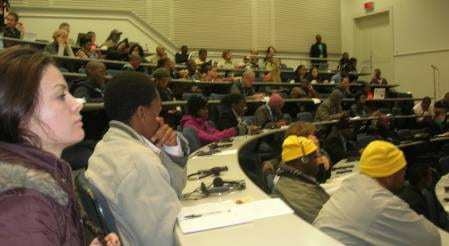GRAHAMSTOWN, South Africa — African Journalists were critical today of reports that U.S. journalists receive subsidies and payments from foundations and the U.S. government.
Two recent Annenberg reports were discussed at an annual media forum here, at the Highway Africa Conference 2010: “Public Policy and Funding the News” focuses on historic and current federal subsidies for news media. And “Philanthropic Foundations: Growing Funders of the News” is an analysis of increasing foundation support for American journalism.
After the presentation, delegates noted that for decades editors from Europe and North America have told African reporters never to accept money from the government, or they would lose their independence. And emissaries from what one person called “the developed world” also told African reporters never to accept payments from anyone who might have an interest in a story.
So when it is the U.S. government that is subsidizing or directly funding newspapers, some Africans believe that must mean American editors must be beholden at least in part to politicians in Washington. Similarly if a foundation is funding news reporting, that appears to be indistinguishable in Africa from cash payments offered to African reporters to report a story.
Now that your journalists have less money, said one participant, suddenly Americans find they can live with government and NGO funding. Another said this might represent unfair competition that could stifle the development and survival of Africa’s independent media.

Objections have also been raised in the U.S., many prompted by a Federal Trade Commission (FTC) discussion paper last month. Titled “Potential Policy Recommendations to Support the Reinvention of Journalism,” the FTC paper raised options for new taxes and subsidies to support traditional news organizations.
Another criticism was that the government proposal was to support older mainstream organizations.
“If the FTC truly wanted to rethink journalism and its new opportunities and new value in our democracy, it would have written this document from the perspective of the people it is supposed to represent: the citizens, examining how we can benefit from news that is newly opened to the opportunity of collaboration and greater relevance,” wrote Jeff Jarvis on his blog. “Instead, the document is written wholly from the perspective of the companies and institutions of the industry.”
Visit African Voices in a Global Media Scape for more information about the conference being attended by Prof. Powell or visit Highway Africa for more information about this organization.